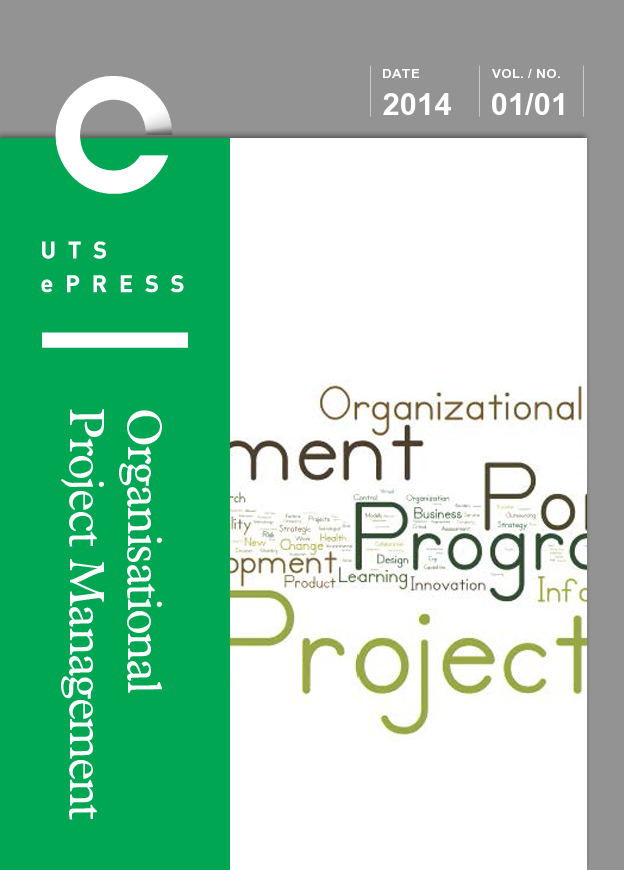The four-level project success framework: application and assessment
Main Article Content
Abstract
Success is one of the ultimate goals of any project endeavour. Thus, clarifying the meaning of success is a vital step in achieving the desired success. In this study, the authors reviewed the project success literature and provided a framework for defining and evaluating project success. The framework consists of four levels that contain the possible criteria for assessing and evaluating success. The authors demonstrate the framework by case application. Further, experts in the field of project management conducted an external evaluation of the framework to assess its merits.
Article Details
Issue
Section
Authors who publish with this journal agree to the following terms:
a) Authors retain copyright and grant the journal right of first publication with the work simultaneously licensed under a Creative Commons Attribution License that allows others to share and adapt the work with an acknowledgement of the work's authorship and initial publication in this journal.
b) Authors are able to enter into separate, additional contractual arrangements for the non-exclusive distribution of the journal's published version of the work (e.g., post it to an institutional repository or publish it in a book), with an acknowledgement of its initial publication in this journal.
c) Authors are permitted and encouraged to post their work online (e.g., in institutional repositories or on their website) prior to and during the submission process, as it can lead to productive exchanges, as well as earlier and greater citation of published work (See The Open Access Citation Advantage Service). Where authors include such a work in an institutional repository or on their website (ie. a copy of a work which has been published in a UTS ePRESS journal, or a pre-print or post-print version of that work), we request that they include a statement that acknowledges the UTS ePRESS publication including the name of the journal, the volume number and a web-link to the journal item.
d) Authors should be aware that the Creative Commons Attribution (CC-BY) License permits readers to share (copy and redistribute the work in any medium or format) and adapt (remix, transform, and build upon the work) for any purpose, even commercially, provided they also give appropriate credit to the work, provide a link to the license, and indicate if changes were made. They may do these things in any reasonable manner, but not in any way that suggests you or your publisher endorses their use.
References
ANDERSEN, E. S., BIRCHALL, D., JESSEN, S. A. & MONEY, A. H. 2006. Exploring project success. Baltic Journal of Management, 1, 127-147.
http://dx.doi.org/10.1108/17465260610663854
BACCARINI, D. 1999. The Logical Framework Method for Defining Project Success. Project Management Journal, 30, 25.
BALACHANDRA, R. & FRIAR, J. H. 1997. Factors for success in R&D projects and new product innovation: a contextual framework. IEEE Transactions on Engineering Management, 44, 276-287.
http://dx.doi.org/10.1109/17.618169
DAVIS, K. 2013. Different stakeholder groups and their perceptions of project success. International Journal of Project Management.
DE WIT, A. 1988. Measurement of project success. International Journal of Project Management, 6, 164-170.
http://dx.doi.org/10.1016/0263-7863(88)90043-9
DO BA, K. & TUN LIN, M. 2008. Success Criteria and Factors for International Development Projects: A Life-Cycle-Based Framework. Project Management Journal, 39, 72-84.
DVIR, D., LIPOVETSKY, S., SHENHAR, A. & TISHLER, A. 1998. In search of project classification: a non-universal approach to project success factors. Research Policy, 27, 915-935.
http://dx.doi.org/10.1016/S0048-7333(98)00085-7
ENGWALL, M. 2003. No project is an island: linking projects to history and context. Research Policy, 32, 789-808.
http://dx.doi.org/10.1016/S0048-7333(02)00088-4
HAMIDOVIC, A. & KRAJNOVIC, S. Year. An example of a novel approach to measuring projects success within ICT industry. In: Telecommunications, 2005. ConTEL 2005. Proceedings of the 8th International Conference on, 15-17 June 2005 2005. 677-682.
HAN, W. S., YUSOF, A. M., ISMAIL, S. & AUN, N. C. 2012. Reviewing the Notions of Construction Project Success. International Journal of Business and Management, 7, 90-101.
HOWSAWI, E., EAGER, D., BAGIA, R. & NIEBECKER, K. 2014. Success Strategies For Project Management During National Crises: Insights From The British Aviation Industry During World War Two. International Review of Management and Business Research, 3, 533-556.
IKA, L. A. 2009. Project success as a topic in project management journals. Project Management Journal, 40, 6-19.
http://dx.doi.org/10.1002/pmj.20137
JUGDEV, K. & MÜLLER, R. 2005. A retrospective look at our evolving understanding of project success. Project Management Journal, 36, 19-31.
KERZNER, H. 2013. Project management: a systems approach to planning, scheduling, and controlling, Wiley.
MAANINEN-OLSSON, E. & MÜLLERN, T. 2009. A contextual understanding of projects--The importance of space and time. Scandinavian Journal of Management, 25, 327-339.
http://dx.doi.org/10.1016/j.scaman.2009.03.011
MARTIN, T. & SCHMIDT, R. 1987. A Case Study of the F-20 Tigershark, RAND Corporation.
MCLEOD, L., DOOLIN, B. & MACDONELL, S. G. 2012. A Perspective-Based Understanding of Project Success. Project Management Journal, 43, 68-86.
http://dx.doi.org/10.1002/pmj.21290
MILIS, K., MEULDERS, M. & MERCKEN, R. Year. A quasi-experimental approach to determining success criteria for projects. In: Proceedings of the 36th Annual Hawaii International Conference on System Sciences, 2003., 6-9 Jan. 2003 2003. 12 pp.
PEREIRA, J., CERPA, N., VERNER, J., RIVAS, M. & PROCACCINO, J. D. 2008. What do software practitioners really think about project success: A cross-cultural
SHENHAR, A. J., DVIR, D., LECHLER, T. & POLI, M. Year. One size does not fit all—true for projects, true for frameworks. In: Proceedings of PMI Research Conference, 2002. 14-17.
SHENHAR, A. J., DVIR, D., LEVY, O. & MALTZ, A. C. 2001. Project Success: A Multidimensional Strategic Concept. Long Range Planning, 34, 699-725.
http://dx.doi.org/10.1016/S0024-6301(01)00097-8
SHENHAR, A. J., LEVY, O. & DVIR, D. 1997. Mapping the dimensions of project success. Project Management Journal, 28, 9.
THOMAS, G. & FERNÁNDEZ, W. 2008. Success in IT projects: A matter of definition? International Journal of Project Management, 26, 733-742.
http://dx.doi.org/10.1016/j.ijproman.2008.06.003
TURNER, R. & ZOLIN, R. 2012. Forecasting Success on Large Projects: Developing Reliable Scales to Predict Multiple Perspectives by Multiple Stakeholders Over Multiple Time Frames. Project Management Journal, 43, 87-99.
